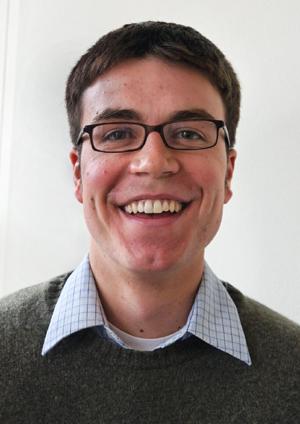
By Michael Rossman, SJ
Throw a group of mostly strangers together for a week in a van and something seems to happen. When this is done in the context of service and faithful reflection, it is often an opportunity for tremendous personal and spiritual growth.
As an undergraduate student, I participated in many service trips. While the work that we did was often valuable, there is only so much a group can do in a week, and it is crucial to recognize one cannot save the world over spring break. Still, when this work was accompanied by personal and theological reflection on what this all meant, how it connected with our faith, and how this needs to translate into a lifetime — not just a week — of action, breakthroughs occurred for me and others involved.
Now, as a Jesuit and a graduate student, I recently had the opportunity to lead a group of six undergraduate students to Camden, N.J., on an urban immersion and service trip. Camden is the poorest city in the country and one of the most violent. A brutal, gang-related murder was a prominent item in the news when we arrived. At the same time, we also were able to meet many inspiring people of Camden who are deeply committed to the betterment of their community.
While I continue to receive a tremendous formal education, many of my most formative personal and even intellectual experiences have taken place outside of the classroom. One of my favorite college classes was on the economics of poverty, but actually talking and sharing life with refugees and with men who are homeless has done far more for my understanding. This theme of needing to experience and not just theoretically learn has also been a theme in Catholic social teaching.
So, what actually happens during such experiences? What happens when we put aside the theory, as valuable as it is, and are immersed in environments very different than our own?
One student in my group shared that prior to this week, she had been skeptical of “social justice types” and many of their causes, as she had felt that many of them forgot about God. This student is passionately committed to the pro-life movement, and she powerfully shared with the rest of us how her week of being with the poor and reflecting on such experiences had led her to internalize how things like poverty were related to abortion. Just as her faith leads her to fight for the life of the unborn, her faith now inspires her to work for the betterment of other voiceless people in our society.
Another student shared that even though she had attended Catholic schools for most of her life, she had gotten away from her faith in college. During this week, however, she “found” something again in her faith and felt that she wanted to come back more strongly to the church.
This student and others I have met indicate to me how service trips and other similar experiences, particularly when accompanied by theological reflection, can be a way to reach young people who are either unfamiliar with or distanced from the church. I see many in my generation who are passionate about selflessly promoting the common good of society, but who may not initially be attracted to an institutional church. Yet, when they see that this very same institution has acted with and written prophetically about the poor, they may be more receptive. Moreover, many of the materially poor are also very spiritually rich, and when those of us trying to serve are open to forming relationships with the poor and allowing them to serve and evangelize us, they have a way of pointing us to God and to the church.
Camden, N.J., is not exactly the most popular spring break destination; the group of students I accompanied who gave up their spring break to be immersed in an uncomfortable environment is not necessarily representative of all young people. Still, the experiences of these students illustrate the potential impact reflective service experiences can have on the personal and spiritual formation of young people today.
(Michael Rossmann is a graduate of Regina Catholic Education Center in Iowa City. In August, he professed vows in the Society of Jesus, more commonly known as the Jesuits. He can be contacted at rossmann.michael@gmail.com.)








